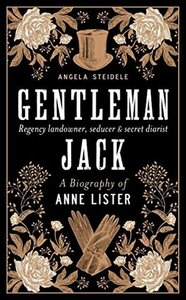Take a photo of a barcode or cover
108 reviews for:
Gentleman Jack: A Biography of Anne Lister, Regency Landowner, Seducer and Secret Diarist
Katy Derbyshire, Angela Steidele
108 reviews for:
Gentleman Jack: A Biography of Anne Lister, Regency Landowner, Seducer and Secret Diarist
Katy Derbyshire, Angela Steidele
Pretty fascinating account of the life of an absolute narcissist. Anne Lister is a pretty much a villain, but also undoubtedly paved the way for women, specifically queer women.
Anne Lister is some one who I always want to know more about, I find her so fascinating. I had really high expectations for this book but it fell a little flat for me. Don't get me wrong it's a super interesting read, but after you've read about 100pages it tends to get a bit repetitive.
Full disclosure before I start: my grandma is Helena Whitbread, who initially published the diaries in the 1980s.
Anne Lister was a fascinating woman, both publicly and privately. She was also a colossal narcissist who would have been a nightmare on social media; instead she had her journal.
This book highlights that, although relies incredibly heavily on the transcriptions of Helena and Jill Liddington, with some reference to the notes of Phyllis Ramsden. I was quite frustrated that the author of this book would dismiss parts of the journals as not being transcribed- when they had been (by my grandma and other writers), but not published. It baffles me that, if you were to undertake such an important biography, you would not want to translate yourself.
I think this is a good general introduction to Anne. I would have liked more social context that could explain why she was such a monster and why she behaved the way she did, politically. I also found the attempts to shoehorn the Brontës in a bit odd (I do not think- at all- that Wuthering Heights was inspired by Anne and Ann. I also seriously doubt that Charlotte Brontë based the main character in Shirley on Anne, especially as it is generally accepted that she based the character on Emily Brontë. I do acknowledge that the sisters would probably have been aware of her, though.)
I'm also mindful of readers brought to this book by the brilliant TV series and how they might be disappointed by how Anne really was. I think it's important that we take the diaries as 'warts and all', without the benefit of a brilliant screenwriter cleaning them up and repackaging them as entertainment. My hope is that, after reading this book, readers go out and read Helena and Jill's books to learn more about the context in which this extraordinary (if somewhat repellent) woman lived.
Anne Lister was a fascinating woman, both publicly and privately. She was also a colossal narcissist who would have been a nightmare on social media; instead she had her journal.
This book highlights that, although relies incredibly heavily on the transcriptions of Helena and Jill Liddington, with some reference to the notes of Phyllis Ramsden. I was quite frustrated that the author of this book would dismiss parts of the journals as not being transcribed- when they had been (by my grandma and other writers), but not published. It baffles me that, if you were to undertake such an important biography, you would not want to translate yourself.
I think this is a good general introduction to Anne. I would have liked more social context that could explain why she was such a monster and why she behaved the way she did, politically. I also found the attempts to shoehorn the Brontës in a bit odd (I do not think- at all- that Wuthering Heights was inspired by Anne and Ann. I also seriously doubt that Charlotte Brontë based the main character in Shirley on Anne, especially as it is generally accepted that she based the character on Emily Brontë. I do acknowledge that the sisters would probably have been aware of her, though.)
I'm also mindful of readers brought to this book by the brilliant TV series and how they might be disappointed by how Anne really was. I think it's important that we take the diaries as 'warts and all', without the benefit of a brilliant screenwriter cleaning them up and repackaging them as entertainment. My hope is that, after reading this book, readers go out and read Helena and Jill's books to learn more about the context in which this extraordinary (if somewhat repellent) woman lived.
adventurous
inspiring
Well, Ann Lister really was an unpleasant woman, wasn't she. It made me in a rather bad mood listening to this, she just didn't care about anyone else, wrecking lives wherever she went.
I had hoped someone as awesome as she would be, well, better. Do at least something good. But, no.
It made me kind of depressed, so I'm now going to listen to a comedy podcast.
I had hoped someone as awesome as she would be, well, better. Do at least something good. But, no.
It made me kind of depressed, so I'm now going to listen to a comedy podcast.
This is a DNF, at least for now. There's nothing wrong with this per se, it's an alright account of Anne Lister's life... but that's the problem for me. It's very one-dimensional, structured around Lister's love life and ignoring pretty much anything else. I prefer biographies and history books in general which take their subject as a starting point for broader analysis, both of context and subject. I might return to this eventually, but for now I can't see myself prioritizing this over other biographies/historical non-fiction books.
If, like me, you came to Anne Lister, seduced by the TV show, then be aware that her character was definitely improved for the show! While Anne was unapologetic about being a lesbian - and for the time she was about as 'out and proud' as it was possible to be - she was also a serial seducer. If we read a diary by a man detailing the sort of conquests Anne lists, not to mention her careful premeditation on how to seduce, manipulate and occasionally coerce women in to her bed, we would be saying some very salty things about his morality and calling him a womaniser. Anne was very much about the chase. She often had three or four lovers on the go at a time, and while she might have been inclined towards polyamory, she rarely included her partners in the decision making. In other words, she had at least two long standing understandings of commitment with two separate women and then cheated on both of them constantly with various different woman. Excerpts of her diary would definitely seem to support the author's opinion that Anne enjoyed seduction for its own sake, and while she was hardly immune to forming long standing attachments, she fell in and out of love quickly and one person was never enough for her.
Anne was a fascinating individual. She exhibited a headstrong desire to go her own way, a very developed sense of self, intelligence and will power - and the less admirable traits of selfishness and using her cleverness to manipulate everyone around her in order to have her own way. As nice as it would be to be able to hold her up as an example of a pioneering lesbian, Anne was progressive only in so far as it suited herself. She was a life long Tory, a member of the landed gentry and very resistant to having the rights of that class curtailed, she was classist and snobbish about the nouveau riche, she happily used child labour on her farms and in her coal mines, and she was actually rather dismissive of other women; paradoxically, she adopted the attitude of Victorian men whereby women were to be discreet, humble, virtuous and chaste, while still pursuing more vigorous mental and physical stimulus herself and expecting the women she dallied with to be clever, refined and genteel. In short, it seems no one really quite met her high standards and that her love was lavished entirely on herself.
All that sounds rather damning but Anne was remarkable in that she insisted on carving out a place for herself in a society that was becoming increasingly restrictive and chauvinistic. Worth remembering that during the 18th C there was initially no ban on women voting if they happened to be the land owner of that borough. By the time Anne owned Shibden Hall, women were forbidden to vote regardless of status. No doubt some of Anne's more unattractive traits came about as a direct consequence of the time she lived in and the lengths she was forced to go to in order to act with agency on her own whims. Certainly no one would criticise a man of that time in the same way Anne was criticised!
There are lots of biographies of Anne Lister - many deal with her being a female land owner and refer to her diaries as important historical documents (having carefully repressed and ignored the coded passages which detailed her conquests, her sexual exploits and the quality of her orgasms.) I think this book is an important introduction into Anne as a whole person and certainly her diaries are at least as important as a document of LGBTQ+ history as they are of the changing times of the beginning of the industrial revolution. She may not have left the world better than she found it and she was monstrous in many ways in her treatment of her lovers and wife, but she was a vivid, strong willed person who ran at life and adventure and there's a lot to admire in that. On the whole, I found the author largely unbiased; not interested in presenting Anne as a lesbian saint or as a cliché predatory queer, but as a person with both good and bad qualities. It does a lot to restore Anne's personal life to the record and combat the erasure of lesbians from history. While it requires bravery to go against the norm, Anne wasn't facing the same oppression and risk of death that homosexual men were during the same era. It was a different set of prejudices. It was widely accepted that women would form 'romantic friendships' with other women and then marry, completely unsullied by whatever may have occurred. It was an era where unmarried women usually shared a bed with another woman - witnesses to their mutual chastity. So while Queen Victoria declared a homosexual relationship between women to be impossible and therefore not to exist, it wasn't unusual or even necessarily frowned on for such relationships to occur. ( There's a huge misogynistic mindset behind all of this which I won't get into now.) However, while women were unlikely to be hanged or imprisoned for a homosexual relationship as some men were, prejudice could take the form of complete erasure (especially historically), ostracism (this was something you could really only be open about if you were both mentally tough and wealthy enough to resist social sanction.) and of course, sadly, correctional rape.
Anne Lister's wife, Ann Walker, seems to have been an extraordinarily brave woman to have gone against her friends and family and social opinion to move in with Anne Lister having 'married' her. Especially since she was of a naturally shyer disposition than AL.
Anyway I've rambled enough. This is a very interesting book and AL's diaries are important historical documents. Don't expect the charming, headstrong but mostly likeable heroine of the TV drama but if you're interested, I definitely recommend this.
Anne was a fascinating individual. She exhibited a headstrong desire to go her own way, a very developed sense of self, intelligence and will power - and the less admirable traits of selfishness and using her cleverness to manipulate everyone around her in order to have her own way. As nice as it would be to be able to hold her up as an example of a pioneering lesbian, Anne was progressive only in so far as it suited herself. She was a life long Tory, a member of the landed gentry and very resistant to having the rights of that class curtailed, she was classist and snobbish about the nouveau riche, she happily used child labour on her farms and in her coal mines, and she was actually rather dismissive of other women; paradoxically, she adopted the attitude of Victorian men whereby women were to be discreet, humble, virtuous and chaste, while still pursuing more vigorous mental and physical stimulus herself and expecting the women she dallied with to be clever, refined and genteel. In short, it seems no one really quite met her high standards and that her love was lavished entirely on herself.
All that sounds rather damning but Anne was remarkable in that she insisted on carving out a place for herself in a society that was becoming increasingly restrictive and chauvinistic. Worth remembering that during the 18th C there was initially no ban on women voting if they happened to be the land owner of that borough. By the time Anne owned Shibden Hall, women were forbidden to vote regardless of status. No doubt some of Anne's more unattractive traits came about as a direct consequence of the time she lived in and the lengths she was forced to go to in order to act with agency on her own whims. Certainly no one would criticise a man of that time in the same way Anne was criticised!
There are lots of biographies of Anne Lister - many deal with her being a female land owner and refer to her diaries as important historical documents (having carefully repressed and ignored the coded passages which detailed her conquests, her sexual exploits and the quality of her orgasms.) I think this book is an important introduction into Anne as a whole person and certainly her diaries are at least as important as a document of LGBTQ+ history as they are of the changing times of the beginning of the industrial revolution. She may not have left the world better than she found it and she was monstrous in many ways in her treatment of her lovers and wife, but she was a vivid, strong willed person who ran at life and adventure and there's a lot to admire in that. On the whole, I found the author largely unbiased; not interested in presenting Anne as a lesbian saint or as a cliché predatory queer, but as a person with both good and bad qualities. It does a lot to restore Anne's personal life to the record and combat the erasure of lesbians from history. While it requires bravery to go against the norm, Anne wasn't facing the same oppression and risk of death that homosexual men were during the same era. It was a different set of prejudices. It was widely accepted that women would form 'romantic friendships' with other women and then marry, completely unsullied by whatever may have occurred. It was an era where unmarried women usually shared a bed with another woman - witnesses to their mutual chastity. So while Queen Victoria declared a homosexual relationship between women to be impossible and therefore not to exist, it wasn't unusual or even necessarily frowned on for such relationships to occur. ( There's a huge misogynistic mindset behind all of this which I won't get into now.) However, while women were unlikely to be hanged or imprisoned for a homosexual relationship as some men were, prejudice could take the form of complete erasure (especially historically), ostracism (this was something you could really only be open about if you were both mentally tough and wealthy enough to resist social sanction.) and of course, sadly, correctional rape.
Anne Lister's wife, Ann Walker, seems to have been an extraordinarily brave woman to have gone against her friends and family and social opinion to move in with Anne Lister having 'married' her. Especially since she was of a naturally shyer disposition than AL.
Anyway I've rambled enough. This is a very interesting book and AL's diaries are important historical documents. Don't expect the charming, headstrong but mostly likeable heroine of the TV drama but if you're interested, I definitely recommend this.






